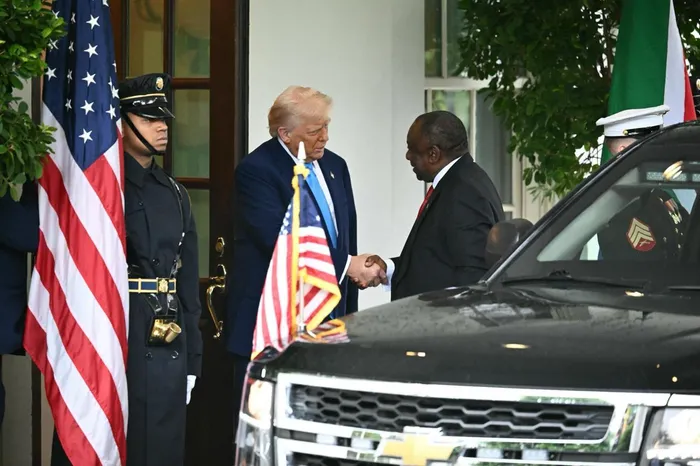
US President Donald Trump welcomes South African President Cyril Ramaphosa to the White House in Washington, DC, on May 21, 2025. Ramaphosa meets Trump amid tensions over Washington's resettlement of white Afrikaners that the US president claims are the victims of "genocide."
Image: Image: Mandel NGAN / AFP
What began as a routine diplomatic meeting intended to reset US-South Africa relations quickly descended into a tense confrontation as President Donald Trump pressed South African President Cyril Ramaphosa on the controversial topic of “white genocide” and land reform in his country.
Held at the White House on Wednesday, the bilateral meeting featured high-level South African officials and business figures, including Cabinet ministers Parks Tau, Khumbudzo Ntshavheni, Ronald Lamola, DA leader John Steenhuisen, labour federation COSATU’s Zingisa Losi, and billionaire Johann Rupert. However, the delegation’s composition, which even included professional golfer Ernie Els, sparked criticism back home for lacking key government figures and skewing toward elite business interests.
As cameras rolled in the Oval Office, Trump wasted no time diving into the inflammatory topic. He opened with graphic videos and clips of EFF leader Julius Malema, including footage of rallies where the chant “Kill the Boer” was heard — a moment that set the tone for the rest of the meeting.
“We’ve seen a tremendous number of white farmers fleeing South Africa,” Trump said. “We believe people are being persecuted, and we take that seriously.”
According to sources close to the meeting, Trump even demanded to know why Malema “hasn’t been arrested,” calling him “an idiot.” He also cited what he claimed were rising numbers of Afrikaner asylum seekers and a surge in emigration as proof of a crisis.
The spectacle was reminiscent of Trump’s past confrontational encounters with world leaders, including a now-infamous clash with Ukrainian President Volodymyr Zelensky. But unlike Zelensky, Ramaphosa remained composed.
Ramaphosa rejected the narrative of white-targeted violence as a gross misrepresentation. “Yes, there are challenges with crime, but they affect all South Africans — black and white alike,” he said, while pointing out that the “Kill the Boer” chant was the rhetoric of minority opposition voices and not reflective of national policy.
To underscore the message, Ramaphosa asked Agriculture Minister John Steenhuisen to elaborate on the government’s crime-fighting efforts and inclusive development policies.
Trump continued to hammer the issue of land expropriation. “Your land reform enables seizure without compensation. That’s not something we can ignore,” he told Ramaphosa.
“Our land reform policy is constitutional and seeks to address centuries of injustice. It is not about targeting any group. We welcome international oversight — but not misinformation.” Ramaphosa responded
While no major economic agreements were inked, Ramaphosa did manage to avoid a full-blown diplomatic rupture. Analysts suggest that by calmly addressing the allegations, he succeeded in preventing what could have become a major derailment in U.S.–South Africa relations.
However, criticism back home was swift. Commentators and political opponents questioned the nature and purpose of the visit, describing it as poorly planned and overly focused on business interests. “This is not how serious diplomacy is conducted,” one analyst told national broadcaster SABC. “You don’t walk into a diplomatic firestorm flanked by a billionaire and a golfer.”
Speculation also swirled that the trip was intended less for diplomatic breakthroughs and more to open doors for business partnerships, particularly involving Elon Musk’s Starlink satellite service.
Despite the drama, Ramaphosa sought to strike a hopeful tone as the meeting concluded. “The relationship between South Africa and the United States is strong, rooted in shared democratic values. We must not allow misinformation and divisive rhetoric to threaten that bond,” he said.
Though bruised by the confrontation, Ramaphosa emerged diplomatically intact — a small victory in a week that could have ended far worse for South Africa’s image on the global stage.
Related Topics: